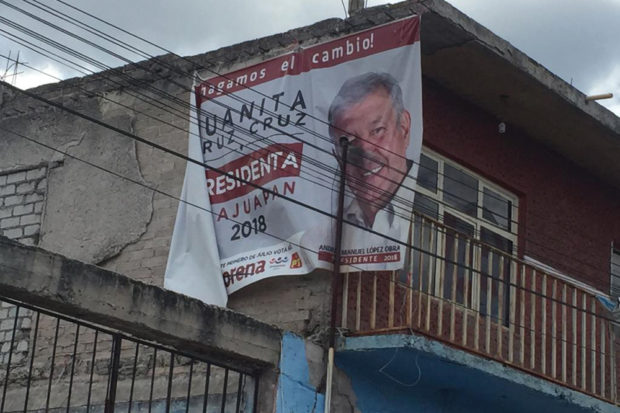
By Eduardo Stanley
On July 1, Mexico held its general election, the results of which are considered historical. It turns out that winner and future president of the country is Andrés Manuel López Obrador (AMLO), a pragmatic politician, who stays away from excesses and the luxuries of power and who proclaims a policy of austerity, to fight against corruption, increasing social plans and general education for the population, as well as measures to control drug trafficking in a different way.
Considered a part of the “left” by the traditional press, AMLO, 64, is a moderate reformer. He was a popular mayor of Mexico City from 2000 to 2005, when he was displaced under pressure from then President Vicente Fox and his allies.
What is surprising about the victory of the AMLO and his National Regeneration Movement (MORENA) is its proposal for social change that made the main forces in power unite against it. He faced strong smearing campaigns and endless investigations that could never prove acts of corruption.
“AMLO managed to channel popular discontent and carry his message to the broadest political spectrum…Citizens got fed up with traditional parties,” said Dr. Jonathan Fox, a professor at the School of International Service, American University, based in Washington, D.C. “The PAN governed during two periods (2000-2006 and 2006-2012) without much success. The PRI returned to power in 2012 and citizens’ perception was not good.”
The PRI (Institutional Revolutionary Party) governed from 1929 to 2000, and after 2012 to 2018. This party is held responsible for having established a vertical power structure based on corruption in Mexico, creating a powerful political and social class with great privileges at the expense of a poor and marginalized majority. In 2000, the PAN (National Action Party) came to power with Vicente Fox, who was succeeded by Felipe Calderón in 2006. The PAN is also conservative and kept the power structure intact.
The popular discontent grew and was expressed in the polls. MORENA won 30 of the 32 states in the country, obtained a majority in the Chamber of Deputies and the Senate, and the AMLO received a strong 53% of the popular vote, against 22.5% of the PAN and 16.4% of the PRI.
According to voter registrations, a little more than 87 million registered to vote on July 1, of which 52% are women. It is important to note that the pressures for change come from young people. Precisely, 11 million voters belong to the category of people 20-24 years of age.
Support for the AMLO and MORENA comes, precisely, from the youngest and from the women. The political capital of the president-elect of Mexico is great. But will he be able to implement the changes he proposes?
“The idea that there is a legitimate government is very important and with the majority in congress he will have power,” Fox said. “He wants to deal with drug trafficking by legalizing marijuana and getting small poppy producers to sell their product to the pharmaceutical industry.”
Fox adds that the president-elect is interested in signing the San Andrés agreements, negotiated until 1997 between the Zapatistas and the Mexican government, but in that year President Ernesto Zedillo, of the PRI, withdrew from the negotiations. These agreements, according to Fox, would be of benefit to the indigenous communities of the country.
But the Zapatistas do not believe in the AMLO.
“They do not trust the electoral process and also the AMLO allies in Chiapas are their opponents,” Fox explains. And he adds, regarding the future of the PRI: “Many said that it would die in 2000, and it was not like that. Surely we will see a rout of PRI members to MORENA, but it is difficult to say that it will disappear.”
On the other hand, the situation of MORENA is unpredictable as it is a movement united by the presence of the AMLO, which can compromise its future.
With the arrival of the AMLO to the presidency of Mexico, will relations with the United States change?
“We will see more of the same, I do not think it will reach extremes. These two societies are very integrated, there is a long history regarding this,” said Fox.
The great unknown is what role Mexican migrants will play in the United States. Although in July more Mexicans voted from the United States, the figure is low (almost 100,000 votes came from the United States) in relation to the number of Mexicans living north of the Rio Grande.
“This is a great challenge for Mexicans on this side in the face of the opportunities that open in Mexico,” concluded Fox.
Will Mexican migrants participate in the changes that are coming or will they be mere spectators?
*****
Eduardo Stanley is a freelance journalist for several Latino media outlets and a Spanish radio show host at KFCF in Fresno. He is also a photographer. To learn more about his work, visit www.eduardostanley.com,
